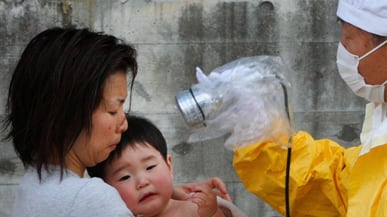Those most affected by the nuclear crisis could be the next generation of Japanese. Alizah Salario on what radiation does to a fetus—and why cultural stigma could make things even worse. Plus, full coverage of the Japan quake.
Like the earthquake and tsunami that hit Japan and made life a grim struggle for survival, the radiation crisis now engulfing the country threatens its weakest the most: elderly, children, and infants.

But it also threatens a group that doesn’t even know disaster has struck: Japan’s unborn children. A full-blown nuclear meltdown would be devastating for pregnant women and their fetuses, which are particularly vulnerable to the lasting effects of radiation. Should the worst-case scenario become a reality, it could lead to a generation of children born with all manner of maladies, from congenital malformation to mental retardation.
Even at radiation levels too low to make a mother-to-be sick, health consequences for a fetus can be severe, according to the Centers for Disease Control and Prevention. Fetal exposure to radiation is particularly damaging during the stage of organogenesis (9-42 days), a period of gestation crucial to the development of the heart, lungs, and brain, according to Dr. Evan Douple, the Associate Chief of Research at the Radiation Effects Research Foundation in Hiroshima and Nagasaki.
Because ionizing radiation can cause DNA damage, it can thwart the cell division necessary for healthy formation of essential organs. Birth defects resulting from exposure to radiation include smaller organs, microcephaly (a condition in which a baby is born with a smaller brain) and lowered cognitive functioning. However, these effects “usually require relatively high doses of radiation” and such extreme levels are not yet confirmed, said Dr. Douple in an email.
Although the precise levels of radiation in Japan are currently unknown, rescue teams are working round the clock to mitigate exposure. 140,000 people have been evacuated within a 30-kilometer radius of the reactors. Once evacuated, pregnant women have been encouraged to stay within the shelter of a building to avoid contamination by ingesting or inhaling radionuclides, said Douple.
Effects of atomic radiation still carry a certain amount of shame in Japanese society.
Considering that Japan is in the throes of a massive humanitarian crisis, there’s currently no disaggregated information about pregnant women available, according to Francis Markus, the East Asian regional communications deputy for the International Federation of the Red Cross. “As a whole, the situation is giving rise to anxiety, and it’s clear that the radiation is a serious additional stress factor,” said Markus, who is currently stationed in Tokyo.
Dr. Irina Dardynskaia, a professor of environmental & occupational health sciences at the University of Illinois at Chicago, advised that early iodine supplementation and concerned efforts by pregnant women to eat only non-contaminated food will also decrease the potential effects of fetal exposure to radiation. Dardynskaia, who has done extensive research on Chernobyl, cautioned that in the event of a meltdown or an explosion, pregnant women beyond the 30-kilometer evacuation radius will likely be susceptible to radiation, but the direction of the wind is crucial to the spread contamination.
“The Chernobyl accident was unexpected, and a lot of people, including pregnant women, were exposed because of absence of preventive measures during the first two weeks after the accident (shelters, iodine supplements, supply of non-contaminated food, cessation of breast feeding, etc),” said Dr. Dardynskaia in an email. “Japan is taking preventive measures, and a lot of things will be dependent on how good these preventive measures are, and how much radioactivity will be in the air after the explosion.”
But even a relatively small amount of exposure to radiation could be dangerous. Although some researchers say babies who receive a small dose of radiation (equal to 500 chest x-rays or less) don’t have an increased risk for birth defects, a 2007 long-term study by the National Bureau of Economic Research found that fetal exposure to ionizing radiation after Chernobyl impaired cognitive ability at levels previously considered safe.
The crisis has opened old wounds in regards to Japan’s unique history of radiation exposure, reminding those old enough to recall World War II of the social stigma that plagued parents of afflicted babies.
“If we go back to the history of the atomic bombs, one of the things that happened was that parents typically would not apply for their bomb victims health booklets because they worried they’d be identified as hibakusha,” said Norma Field, a professor of Japanese culture and literature at the University of Chicago.
Hibakusha, the Japanese word for “radiation-exposed people,” generally refers to people in Hiroshima and Nagasaki when the atomic bombs were dropped, but the term can be used for anyone exposed to radiation. Field explained that parents exposed to radiation didn’t want their children to be known as hibakusha because they feared it would hurt their marriage prospects. In Japan, there is more scrutiny of a potential partner by prospective in-laws, and the stain of hibakusha can even be passed down to the second and third generation.
“[Radiation] can take decades to manifest as illness, so there’s a secondary element of protracted dread,” said Field.
Effects of atomic radiation still carry a certain amount of shame in Japanese society, suggested Yuki Miyamoto, a doctor of religious ethics at DePaul University in Chicago. Miyamoto noted that babies born with microcephaly were often hidden because their presence might affect other siblings' marriage or employment prospects.
“Everyone is noticing how orderly people are amid chaos in Japan,” said Miyamoto. “The bad side is that if you do something outside of the norm, you’ll be ostracized.”
In Japan, said Miyamoto, “a nail that sticks out needs to be pound down,” which is a common proverb referring to the cultural penchant for conformity. The notion of putting the community before the individual has both positive and negative consequences in times of crisis.
Field suggested that the concern associated with potential birth defects is the same for Japanese mothers as it would be for mothers around the world, but it may be more acute in Japan not because of shame, but because there tends to be more awareness about the implications of radiation.
“To me, it’s not accidental that so many Japanese activists signed onto activism about Chernobyl and depleted uranium [a material used by the military for defensive armor plating that has been linked to cancer and kidney damage],” said Field.
Indeed, women have been a strong component of anti-nuclear campaigns in Japan, and Miyamoto sees the crisis as a critical intersection for the future of Japan.
“My hope that if a good thing could come out of this immeasurable disaster, it would be Japan's radical change from depending on nuclear power to natural sources.”
Alizah Salario is a freelance journalist based in Chicago. Her work has appeared in Women's eNews, Ms. Magazine, The Huffington Post, at the Poetry Foundation and elsewhere.






